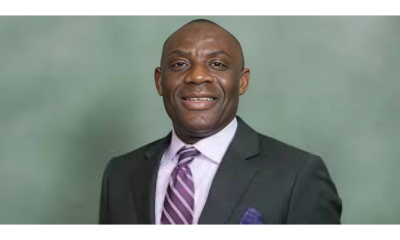NEWS
FG Commends TETFund’s Broker Relationship Between Academia, Industry

The Minister of Education, Prof. Tahir Mamman has commended the Tertiary Education Trust Fund (TETFund) for proffering solutions to the missing link between academia and the industry.
Mamman made the commendation in Abuja on Tuesday during a press conference on the TETFund Research Exhibition, scheduled to hold in November 17.
The minister said intense and wide consultations were ongoing with institutions and organisations that could partner with and support TETFund.
This he said was to drive interest and encourage organisations and individuals to participate and identify technologies with a view to establishing enterprises and/or enhancing the performance of existing businesses.
The minister expressed confidence in the fund for recognising the imperative need to enhance the linkages of these impressive academia performances to industry and the day-to-day life on the average Nigerian.
“This is in line with the Renewed Hope Agenda of Mr President, which mainly aims at “rebooting” the economy through the massive generation of jobs, creation of wealth and the improvement of the general welfare of Nigerians.
“It is also to see and use such technologies for establishing viable enterprises for the provision of goods and services with net effect of massive generation of jobs, creation of wealth,” he said .
Mamman added that to implement the mandate, TETFund had further established a Research Fair Sub-Committee under the NRFS&MC in July 2024, to serve as the Local Organising Committee (LOC).
According to him, the committee are to urgently take stock of all research output technologies from Universities, Polytechnics, Colleges of Education, Research Institutes and others, and document them.
“They are to also screen and select candidate technologies to be showcased at the research fair with emphasis on technologies that will immediately impact upon and grow the national economy.
“To cluster selected technologies into sectors to ease exhibition and catalyse the interest of potential investors and entrepreneurs.
“To identify, collaborate, reach out to and closely work with all relevant stakeholders (business support, funding and IP management) for success and effectiveness of the fair,” he added.
He added that financial institutions, funding agencies and venture capitalists had been identified to provide funding to the promising organisations, individuals and entrepreneurs who source technologies to establish enterprises.
He also said that the Call Circular inviting the Institutions and individuals to submit their technologies as entries to the fair had been finalised and would be released today.
He urged researchers, inventors and creators who expressed interest to showcase their technologies, to participate free of charge in the fair.
The Chairman, TETFund research fair committee, Mr Umar Bindir, promised to take the bull by the horn to deliver on the mandate of the president in the area of research.
On his part, the TETFund Executive Secretary, Sonny Echono, expressed the appreciation of the federal government for the commencement of the project through the media briefing.
Echono pledged the readiness of the fund to harness the potential recorded in the area of innovation and creativity in tertiary institutions.
He called on private investors to take advantage of the fair to showcase their works, leading to job creation in the country.
The event, which is set to bring together researchers, inventors, and creators to share their cutting-edge projects and visionary ideas, will take place at Eagle Square, Abuja.(NAN)
Education
FG vows full WAEC CBT shift by 2026 – Minister

The Minister of Education, Dr Tunji Alausa, has reaffirmed the Federal Government’s commitment to fully transitioning to Computer-Based Test (CBT) examinations for the West African Examinations Council (WAEC) and other exam bodies by 2026.
Dr Alausa made this known while monitoring the conduct of WAEC’s CBT examinations in Abuja on Wednesday.
He expressed optimism about Nigeria’s capacity to modernise its examination system and reduce widespread malpractice through digital innovation.
Commending WAEC’s initiative, the minister described the shift from traditional pen-and-paper exams to CBT as a historic and crucial step toward fairness and educational integrity.
“We are working very hard to eliminate fraud in our exam system, and WAEC is taking the lead,” he said.
Highlighting the advantages of CBT, Alausa noted that the system simplified the exam process while significantly curbing cheating.
“We now have clear evidence that when exams are done using technology, the level of fraud is minimised to almost zero,” he stated.
He further lauded WAEC’s internal safeguards, explaining that the CBT system was operated via a secured Local Area Network (LAN), making it “literally impossible” to hack.
According to the minister, by Nov. 2025, all WAEC multiple-choice exams will be conducted using CBT.
He added that essay questions and NECO examinations would follow suit by 2026.
On infrastructure and logistics, particularly in remote areas, Alausa acknowledged the challenges but assured that scalable solutions are in progress.
“Are we going to be ready to provide every single needed infrastructure by November? Absolutely not.
“But as we move into the future, we will be ready. We have to challenge ourselves as government,” he said.
He also addressed concerns over the logistics of conducting multiple exams.
“In WAEC, the average student takes about eight to nine papers.
“They do it over several days. Those are the logistics we, as administrators, have to work through, and we already are,” he explained.
The ongoing WAEC exams, which began on April 24, are scheduled to conclude on June 20, 2025.
A total of 1,973,253 candidates from 23,554 schools are participating. Of this number, 979,228 candidates are male, accounting for 49.63 per cent, while 994,025 candidates are female, making up 50.37 per cent.(NAN)
NEWS
Ex-NBA President Seeks Higher Minimum Entry Requirements into Police

A Former President of the Nigerian Bar Association (NBA), JB Daudu (SAN),has advocated for a higher minimum entry requirement for the Nigerian Police Force, suggesting a university degree or its equivalent.Daudu, who is the Coordinator of the Rule of Law Development Foundation made the call at the 13th Webinar series organized by the foundation on Tuesday in Abuja.
Report says that the webinar had the theme `Overview and Mid-Term Report of The Administration of President Bola Ahmed Tinubu (May2023-May 2025)’. He suggests that a more educated workforce would be better equipped to handle the challenges of policing, potentially leading to improved performance and effectiveness“This will ensure that all entry level officers receive a mandatory course in the recognition and enforcement of fundamental human rights that have been enshrined in the Nigerian Constitution (as amended).“It will also ensure that they receive sufficient training in the handling of firearms to curb the wave of accidental discharge of firearms and all other cases of abuse of firearms that our citizens now suffer from’’.“As far as many Nigerians are concerned, the police force is not only moribund, but a large percentage of its personnel are branded as corrupt.“Most Nigerians don’t report crimes in which they are victims because of the fear that they may, in the course of pursuing their rights, be branded as the criminals, or be exploited for financial gain.“The federal government must commence the rebranding of the Nigerian Police Force’’.He equally called for improvement in their remuneration package, the provision of institutional support such as insurance cover, mandatory housing program, promotions as and when due, affordable health services, and educational support.The Learned Silk stressed the need to rewrite the disciplinary protocols of all security agencies and ensure that these rules are subjected to ordinary laws of the land through trials in our criminal courts.“Offences by errant policemen amounting not only to civil disciplinary issues but are also criminal in nature, must attract punishments that fit the offence.“Such offences as reckless misuse of firearms and police power leading to death or serious bodily harm of, and on, innocent victims must be appropriately punished rather than a mere slap on the wrist”.He added that serious and immediate thought must be given to the decentralisation of the Nigeria Police Force.“20 years ago, I championed the advocacy of an autonomous and independent state police completely severed from the umbilical cord of the federal police that is the Nigeria Police Force.“I cannot in good conscience state today that I can still support the creation of a blanket State Police left in the hands of the Governor of a State.“The reason for this shift in position is that the political maturity, and I say this with the utmost respect and humility, of our new set of leaders at the state level is not such as was in existence 25 years ago’’.He noted that creating state police at this point in time is to encourage flashpoints in different parts of the country some of which may escalate into ‘civil wars’.“I shudder to think of what would have happened if certain states which were recently plunged into political crisis had recourse to their police units during the political crisis that recently plagued their states.“For now and until the political actors improve in their political maturity, the alternative would be and should be ‘community police’.“I propose most respectfully a measure where every ward in a local government would have an office of the community police that will monitor and ensure the reportage of all crimes.“This should include the movement of all suspicious characters who may likely pose a threat to the peace and harmony of the community”.He added that where the threat is beyond the capability of the community, and escalates to the remaining wards and the Local government Headquarters, the State Police Command should step in.He said that all the funds being used to buy rice and other palliatives could be used to fund and equip security-watch offices in these locations as described above.“This means therefore that the local government council of every LGA must be made to be the centre point of the maintenance of law and order and the promotion of security in Nigeria.“Note that there is still the corruption factor and strict or severe punishment must be meted on local community police officers who corruptly abuse their power”. (NAN)NEWS
NYCN Demands Probe into DPO’s Killing

The Northern Youth Council of Nigeria (NYCN) has called for a thorough investigation into the killing of CSP Baba Ali, a Divisional Police Officer in Kano State. Report says that the Police Command in Kano confirmed the killing on Monday, along with the burning of the Rano police station.
The DPO was reportedly killed by angry youths in Rano town, Rano Local Government Area, sparking widespread condemnation and concern across the country. In a statement issued on Tuesday in Kaduna, NYCN National President, Isah Abubakar, expressed sorrow and described the incident as a grave national loss. “CSP Baba Ali served with dedication and integrity. His commitment to peace and security must be recognised and remembered,” Abubakar stated. Abubakar urged the Federal Government to launch an impartial investigation, calling for cooperation among relevant agencies to reveal the circumstances of the officer’s death. He emphasised that the investigation must be transparent, keeping the victim’s family and the public informed at every stage. The NYCN president also demanded justice not only for CSP Baba Ali but for all Nigerians striving for safety and security. He called on the government to adopt measures that strengthen security forces and ensure better protection for officers on duty. “The death of CSP Baba Ali underscores the urgent need for united efforts against violence. Government must act decisively to prevent similar tragedies,” he added. (NAN)

















